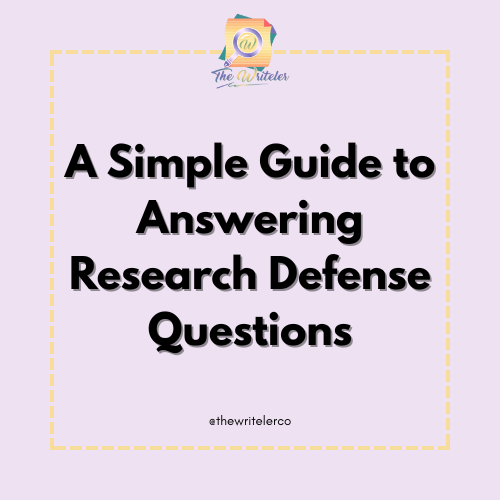A `research defense` is a pivotal moment for any scholar, where your work’s validity, significance, and originality are scrutinized by a panel of experts. Whether you’re defending a thesis, dissertation, or academic paper, thorough preparation is key to success. This guide provides actionable strategies to tackle common research defense questions and impress your evaluators.
Understanding the Core of Your Research
Panels often start with foundational questions to assess your grasp of the research topic.
Common Questions
“What inspired your research topic?”
- How to Answer: Link your passion to academic gaps. Example: “My interest in climate change solutions was sparked by the lack of studies on urban heat islands in tropical regions.”
“What is the main objective of your study?”
- Strategy: Summarize your goal in one sentence. Avoid jargon.
“How does your work contribute to existing literature?”
- Pro Tip: Highlight gaps your research fills. Use phrases like “This study pioneers…” or “Our findings resolve conflicting results in…”
Methodology Mastery Questions
Questions here test your technical expertise and rigor.
Common Questions
“Why did you choose this methodology?”
- Answer Framework: Align with research goals. Example: “Quantitative methods allowed me to statistically validate the correlation between variables.”
“What are the limitations of your chosen approach?”
- Best Practice: Acknowledge limitations but pivot to mitigations. “While a small sample size limits generalizability, I used stratified sampling to enhance accuracy.”
“Did you consider alternative methods?”
- Pro Tip: Demonstrate critical thinking. Compare methods briefly and justify your choice.
Results and Analysis Questions
Panels will probe your ability to interpret findings and connect them to broader implications.
Common Questions
“What were your most significant findings?”
- Strategy: Prioritize clarity. Use visual aids (graphs, tables) in your presentation to reinforce key points.
“How do your results align with existing studies?”
- Example Answer: “Our findings support Smith et al. (2020) on X, but contradict Y due to differences in sample demographics.”
“What explains the unexpected results?”
- Pro Tip: Stay calm. Propose hypotheses without sounding defensive.
Impact and Future Directions Questions
Showcase the real-world relevance of your work and your vision for its evolution.
Common Questions
“What are the practical applications of your research?”
- Answer Framework: Link to industry, policy, or societal benefits. Example: “These insights can optimize energy consumption in urban planning.”
“What future research would you suggest?”
- Strategy: Propose logical next steps. “Future studies could explore X in longitudinal settings to validate causality.”
Handling Tough Questions Like a Pro

Confidence Through Preparation
Mastering research defense questions requires more than rote memorization—it demands deep familiarity with your work and the ability to think on your feet.
Carefully anticipating queries, practicing responses, and embracing feedback, you’ll turn your defense into a compelling narrative that showcases your expertise.

Your research defense isn’t just about answers—it’s about demonstrating your growth as a scholar. 💡
Let The Writeler Co. support you in achieving academic and professional excellence! Whether you need assistance with research writing, proofreading, editing, or data analysis, our expert team is here to help.
📩 Email us today or 📲 message us on our Facebook account to get started. Let’s make your work shine!





0 Comments